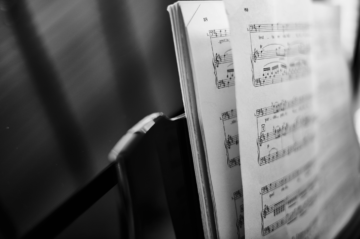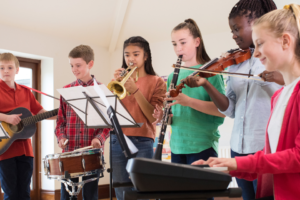
How to Study Music – The Beginner’s Checklist
 Excited to embark on your music educational journey? As a beginner, you’d do well to get a few basics right. And this checklist is supposed to help you identify these basics, and do well on them. Read on!
Excited to embark on your music educational journey? As a beginner, you’d do well to get a few basics right. And this checklist is supposed to help you identify these basics, and do well on them. Read on!
A concrete warm up session
Breaking a sweat is fine but not really necessary. You certainly though want to at least move around and stretch a little since this releases stress from the body and relaxes the mind. This is vital especially before studying to ensure that your mind is clear as a blank slate and you grasp the lessons much faster. It is much easier to play and practice music if your body is lose and not all tightened up.
Do not push yourself over the limit if your mind feels saturated studying for too long. Stop right there and relax for a bit. This will get your mind off it and you can sit back to play again once you feel relaxed and refreshed. You should not have to do this that often unless your practice session is going to be a couple of hours in length.
Organize
This is the most vital aspect that will help you set the tone of the day. In your fast paced lifestyle, it is quite easy to lose track of what you’re doing if you haven’t planned it out in advance. However, if you plan your day out, it becomes much easier for you to go about managing the errands for the day since you know what you want and need to accomplish. You know what needs to get done so tomorrow you can accomplish new tasks that will need to be accomplished, such as you attending school. Start with planning out the day in time slots.
For example, you can allocate an hour for practice today, then split the time equally in segments, such as one segment for practicing long tones, then technique, and the last 20 minutes for exercising.
Consistency
The crux of the matter is that instead of practicing only one section of music at the designated time, cover all the sections that day that you need to cover. Most importantly, consistency wins over everything. Practicing every day is always better than studying for a lengthy amount of time once a week or so. Consistency will ensure that you are improving a little at a time so you do not wear down your brain.
It is no different than studying for a test. Trying to cram a pile of information into your head in a short amount of time is not as effective as focusing on that subject a few times throughout the week at shorter intervals. You may have fellow students who cram work into their heads the night before an exam and watch TV and play video games on most other nights, that is just not the smart way to go about things.
Develop your own sound
It is important for you to understand your own sound. This is best done with practicing different techniques like vibrato, multi-phonics, studying top, over and long tones. It is up to you if you want to use vibrato or not. You can instead practice it in triplets or quarter notes or in any other way.
Scales
Scales are essential to learn because they form the core of every single area of music. As boring as it may seem to a beginner, you just cannot afford to avoid learning this aspect of music. Keep a constant volume for the entire range while using a particular musical instrument.
It is essential for you to practice the entire range of scales with all intervals, patterns, and articulations. There are three different types of minor scales and one major scale. You need to spend enough time on each one so you understand each one. Scales are also accompanied by generic, writing, specific, and inversion intervals.
Arpeggios
An arpeggio is a kind of chord that is broken down into a sequence of notes. Interestingly, some of the notes can be repeated from the chord and can be made to span over a certain number of octaves. An arpeggio exercise that would help expand your music theory would be to concentrate on the essential aspects of playing an instrument. This would help you picture the scales differently instead of visualizing it in the same old way.
Musical exercises
This is a crucial practice in order to further develop on the technique. Hard passages can be divided into tiny fragments and practiced in a slower tempo until you get it right. You can then graduate to a faster tempo, become adept at it, and finally play it according to your predilection.
Transcription and ear training
This is the best way to learn the language. If you want to dive deep into a particular artist’s music like Frank Zappa, for instance, the best way to do so is to transcribe that artist’s music. Listen to a particular phrase, get a hang of it by your ear, and then start practicing on the instrument so you understand the changes and nuances.
A key idea
Avoid transcribing the music of the musicians who play only your instrument. Get creative, expand your horizon, and try transcribing a trumpet or a saxophone if you play a cello, for example. So keep an open mind and listen to everything, try every instrument, transcribe the artists that you think are difficult, and get out of your comfort zone. This will increase your comprehension of music and help expand your knowledge of music in its entirety.
Written by Benjamin Roussey
Contact us today to learn more about how our music instructors can help your child!



